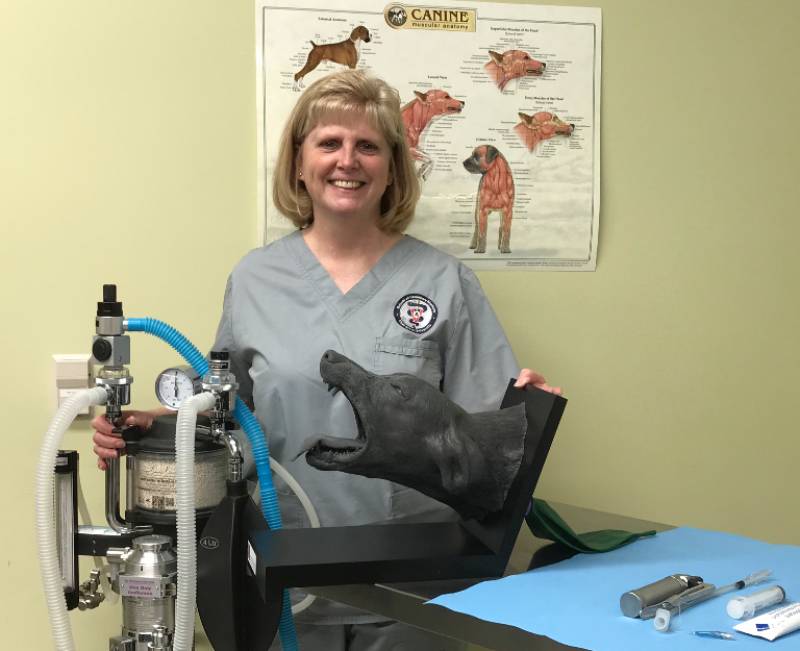Sutures and Snacks: Meet Melisa Bishop, SVM Program Coordinator
Suture patterns, aseptic techniques, and anesthesia aren’t skills that can be humanely learned on the job, so veterinary medicine students need to practice the fundamentals of their craft before working with live patients. However, creating a space for them to do that is challenging and time-consuming, and faculty often lack resources necessary to provide that experience.
Fortunately, Utah State University has Melisa Bishop to step into the breach.
As program coordinator for the School of Veterinary Medicine, Bishop creates the learning environments necessary for students and professors alike to do their work. She makes videos that teach students everything from how to intubate a patient to catheter placement, and she creates surgical models that students use to practice suturing and ligations. Bishop even manages the USU Willed Body program, which allows students to gain vital experience working on actual animal tissue from cadavers donated by local clinics and shelters.
“Every day is different depending on what classes have labs,” Bishop said. “But everything I do is hands-on.”

When students enter a lab, Bishop prepares the equipment beforehand, cleans up afterward, and works with professors during the lesson to guide activities and answer student questions. And when students undergo the diagnostic challenges — arguably the most difficult obstacle they’ll face in the first two years of the WIMU Regional Program — Bishop assists in developing the simulated cases students treat and coordinates the people and resources necessary to make them happen.
Whether she’s out at South Farm to set up a lab for a class or in her office pouring over paperwork in support of clinical communications or the diagnostic challenges, the one constant in Bishop’s work is her drive to facilitate learning.
“My favorite part of my job is the interaction with students,” said Bishop. “I like making their lives easier and giving them the opportunity for more hands-on learning. And I like making teaching and the jobs of faculty a little bit easier by setting up these labs.”
Bishop joined Utah State in 2012 when the School of Veterinary Medicine was founded. The program was in need of an experienced veterinarian technician to help run the Principles of Surgery course, and Bishop had years of experience running a low-cost spay and neuter clinic and providing vaccination and microchipping services for the Cache Humane Society. What started as a small role at the university soon snowballed into something much bigger.
“It’s really changed,” Bishop said. “I went from that one course to senior programs coordinator and managing several labs and part-time to full-time to even more than that. The students now have a lot more hands-on learning because there’s somebody else who can put those labs together.”
Because she is so involved in creating the student experience, Melisa Bishop and her husband, Director of Student and Academic Affairs Michael Bishop, have been nicknamed “Mom and Dad” of the veterinary program. Both of them keep their office doors open for whenever students need to talk, and they each buy snacks that are stored in Michael Bishop’s office cabinet — referred to as the Snack Shack — for whenever students don’t have time for a meal.
“We’ve had students over for dinner that didn’t have a place for the holidays, and we have students and their families over for games and barbecues.” Melisa Bishop said. “In some cases, the first fish their kids caught have been in our backyard trout pond. It’s been a lot of fun to give them a nice, safe environment for that kind of experience.”
While the nicknames are used jokingly, Melisa Bishop and her husband are earnest in their efforts to bring a sense of community to the School of Veterinary Medicine.
“We’re a family-type atmosphere,” said Melisa Bishop, “and that makes all the difference in the world when teaching our students.”

